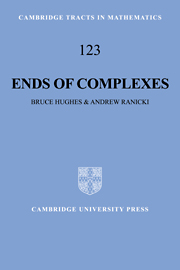Introduction
Published online by Cambridge University Press: 30 October 2009
Summary
We take ‘complex’ to mean both a CW (or simplicial) complex in topology and a chain complex in algebra. An ‘end’ of a complex is a subcomplex with a particular type of infinite behaviour, involving non-compactness in topology and infinite generation in algebra. The ends of manifolds are of greatest interest; we regard the ends of CW and chain complexes as tools in the investigation of manifolds and related spaces, such as stratified sets. The interplay of the topological properties of the ends of manifolds, the homotopy theoretic properties of the ends of CW complexes and the algebraic properties of the ends of chain complexes has been an important theme in the classification theory of high dimensional manifolds for over 35 years. However, the gaps in the literature mean that there are still some loose ends to wrap up! Our aim in this book is to present a systematic exposition of the various types of ends relevant to manifold classification, closing the gaps as well as obtaining new results. The book is intended to serve both as an account of the existing applications of ends to the topology of high dimensional manifolds and as a foundation for future developments.
We assume familiarity with the basic language of high dimensional manifold theory, and the standard applications of algebraic K- and L-theory to manifolds, but otherwise we have tried to be as self contained as possible.
- Type
- Chapter
- Information
- Ends of Complexes , pp. ix - xxiPublisher: Cambridge University PressPrint publication year: 1996
- 1
- Cited by



